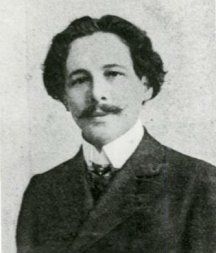Leopold Materna
Leopold Materna was born 26 August 1871 in Graz (Austria) into a musical family. His aunt was Amalie Materna (later Amalie Materna-Friedrich), a renowned singer who premiered many Wagner operas. The elder sister of Leopold Materna was Hedwig Materna, also a famous singer.
Leopold Materna studied music and became choir master of the Philharmonischer Verein in Maribor in 1892. In 1906 Leopold Materna accepted the position of the Opernkapellmeister at the theatre in Linz.
From that time dates an interesting episode with Gustav Mahler: In January 1907 a concert of the Symphony No.1 by Gustav Mahler was scheduled in Linz with the composer himself as the conductor. All preliminary rehearsal had been done by Leopold Materna and Gustav Mahler just wanted to do the last rehearsal on its own. But he came late due to train delays. He took over the baton and started conducting. The following situation was penned down by music critic Franz Gräflinger: "Things went rather well. In fact, they went very well. 'I congratulate you', he said to Materna, who had rehearsed the symphony with dispassionate precision. Mahler merely had to hone a few details."
Leopold Materna became a much valued conductor in the next years. In 1909 he was invited to direct the Antwerp premiere of the Symphony No.4 by Bruckner and conducted the performance of a Chopin piano concerto with Leopold Godowsky in Paris. A year later Leopold Materna returned to Antwerp for performances of Wagner's Rheingold which was hailed by the Belgian press. He also conducted the orchestra of the Wiener Konzertverein (now called Vienna Symphony Orchestra) with violinist Luigi von Kunits in 1910 and was invited to conduct an orchestra in Russia for a season in 1911. Afterwards Leopold Materna returned to Austria and took the position of the Kapellmeister of the Volksoper in Vienna. He also returned to the Vienna Symphony Orchestra occasionally as guest conductor and worked privately as a vocal pedagogue.
The year 1925 must had brought health issues, because Leopold Materna stayed several weeks in the health resort Villach. After his return to Vienna Leopold Materna worked as the choir master of the "Wiener Evangelischer Singverein"
Leopold Materna died on 1 December 1948 in Vienna (Austria).
Leopold Materna composed little music, mostly at an early age. His first compositions were songs of which a selection was already published by Ries & Erler in 1895. He also made arrangements of some Wagner operas for piano four hands at that time.
Among his violin compositions are:
- Reverie - An der Wiege, for violin and orchestra (1900)
- Sonata for violin and piano in c minor (1906)
- Kleine Romanze, for violin and piano (1939)
In my possession are three autograph manuscripts by Leopold Materna: The Reverie, the Kleine Romanze and a Trio for clarinet, horn and piano (1944)
Reverie - An der Wiege, for violin and orchestra
The composition "Reverie - An der Wiege" for violin and orchestra was finished on 02 September 1900 and is Leopold Materna's opus 6. The composition exists in a piano reduction that was published by Schott in 1901. The autograph manuscript in my possession is most likely from the Schott archive as it shows the plate number 26941 on the title page. It also shows that Leopold Materna first titled the work "Gedanken beim Anblick eines schlafenden Kindes" (Thoughts while looking at a sleeping child). The work is dedicated to August Hansel.
Kleine Romanze, for violin and piano
The "Little romance" for violin and piano was composed in 1939 and was never published as far as I know. I neither know of a performance.
Trio for clarinet, horn and piano
The Trio was composed in 1944. My manuscript starts with movement "1. Jugend" (Youth), but no other movements follow. So maybe this composition was left incomplete by Materna or the rest of the manuscript was disconnected from my part sometime in the past.
